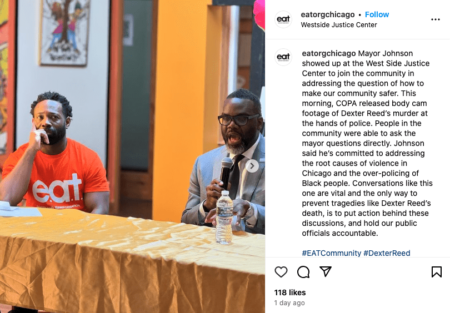As he approached what many people consider retirement age, Jesse White could look back on an eventful life.
He jumped out of airplanes as an Army paratrooper, played minor league baseball for the Chicago Cubs organization, and witnessed seminal moments of the civil rights movement. He created an inner-city gymnastics program that has sent tumblers all over the world for shows.
Advertisement
He also had spent more than 20 years in Illinois politics, as a state legislator and as Cook County recorder of deeds.
At 63, rather than winding down, he took on took on his biggest political challenge, engaging in a contentious fight to be Illinois’ next secretary of state. Michael Madigan, who at the time was Illinois’ powerful House speaker and head of the state Democratic Party, backed another candidate in the primary election.
Advertisement
This didn’t sit too well with White, who had served in the General Assembly with Madigan for more than a decade.
“I’m in it to win it. Let’s do it,” White told supporters when he declared his candidacy for secretary of state, he recalled in an interview. “I averaged 14 to 16 events every day. I was really angry. I was on a war footing.”
White soundly won the March 1998 primary, then handily defeated his Republican opponent in the general election to become Illinois’ first Black secretary of state.
Since he took office in 1999, no one has come close to dethroning White, one of the state’s most popular politicians. He regularly won reelection with more than 60% of the vote and in one election took every one of the state’s 102 counties, including those that were staunchly Republican.
Now 88, White is set to retire after 24 years in office, which makes him by far the longest-serving secretary of state in Illinois history.
In a wide-ranging interview with the Tribune last month from his memento-filled office in downtown Chicago’s Thompson Center, White tried to explain his electoral success, citing first the notoriety he got from his tumbling team.
“But a lot of them knew me because of my basketball and baseball, the whole nine yards,” White said while occasionally thumbing through a thick binder with numerous pictures of him, including one where he’s doing a headstand on a mat.
With the two previous secretaries of state having moved on to the governor’s office, he also made a promise that time proves has been kept: “I indicated that I would not use this office as a steppingstone.”
Advertisement
Born in 1934 in downstate Alton, near St. Louis, White moved with his family to Chicago when he was still a child.
One of seven children, he grew up on West Division Street in an area he recalled being heavily Italian. He lived across the street from the Cabrini-Green public housing complex, where he later became a noted community activist.
He attended Jenner and Schiller elementary schools and was an all-city athlete in basketball and baseball at Waller High School, now Lincoln Park High School.
He went on to be an all-conference player in both sports at Alabama State College (now University) in Montgomery, Alabama. Despite standing only a hair over 5-foot-8 , White said he was recruited to play basketball because of his scoring ability, about which he is not modest.
“I shoot like Curry,” he said, referring to NBA superstar Steph Curry. “I had a jump shot, and they’d never seen a jump shot before.”
According to a 1981 Chicago Tribune article, he held the school’s four-year scoring record of 1,620 points by the time he finished his collegiate career.
Advertisement
While in Montgomery, he got to know the Rev. Martin Luther King Jr. after he was encouraged to attend King’s church. He recalled King discussing the arrest of Rosa Parks for refusing to move to the back of a bus, and King saying he had been asked to lead efforts to desegregate the city’s bus system.
“And he said he agreed to do so but he’s going to use a nonviolent-means approach,” White said.
White said he raised his hand to speak.
“I said, ‘Dr. King … you know I’m from Chicago but we don’t operate like that,’” White recalled telling King. “And he said, ‘Just follow the script and everything will be fine.’”
The boycott lasted for a little over a year, with the U.S. Supreme Court eventually ordering Montgomery’s bus system to be integrated while King was launched as a national figure. White acknowledged those events had a profound influence on his life.
“There’s some people out there who don’t have love or respect for their fellow man and woman, and I dare not ever participate in that kind of activity,” he said. “I teach my young people to love their fellow man and woman and never ever dislike anyone because of race, creed or color.”
Advertisement
White also remembered how King would give him $20 after basketball games.
“That was legal then but I don’t think it’s legal now,” White said with a chuckle. “I was on public aid. My family was poor.”
White got a tryout with the Cubs at Wrigley Field, but a few days before his first spring training, he was drafted into the Army, serving as a paratrooper with the 101st Airborne Division at Fort Campbell, Kentucky.
By the late 1950s, he was back on the baseball diamond, starting out in D ball, the lowest minor league classification at that time. Primarily an outfielder, White eventually made it to Triple-A, playing for a team in Salt Lake City. He batted .291 in seven minor league seasons for the Cubs organization.
During that same time, in 1959, he founded the Jesse White Tumblers, a program aimed at providing direction and discipline to inner-city youths.
Over the last 63 years, more than 18,500 young people have performed for the Tumblers in shows all over the world. White takes pride in running a tight ship.
Advertisement
“The kids in my program, they have to be leafless, smokeless and pipeless. So the only time they can practice pharmacy is after they wear a white coat,” White quipped. “They have to be in school on time everyday.”
Two of his press aides are veterans of the tumbling team.
“He’s very no-nonsense, very strict, very tough love. But he also sees the potential and does encourage you and gives you a lot of great feedback,” Joseph McGhee, who performed at President Barack Obama’s 2009 inauguration and now helps coach the team, said of White. “He notices the ones who are very, very dedicated and …. the ones that will slack off a little bit.”
Among the many plaques and photos in White’s Thompson Center office is a picture of former Cook County Board President George Dunne, whom White credits for getting him into politics. Dunne also headed the 42nd Ward political organization, which pushed for White to run for state representative in the 1970s.
The district’s boundaries included the tony Gold Coast, Lincoln Park, River North and also Cabrini-Green, the sprawling public housing complex that struggled with crime, poverty and other societal ills. White recalls asking about the district’s demographics, and Dunne explained that it was largely white.
“I says, ‘I had two strikes against me and a curve ball coming up,’” White remembered. “He said, ‘You’ll do fine.’”
Advertisement
White went on to serve in the Illinois House of Representatives for 16 years. He said he “got along with all factions of my district,” before resigning to run for Cook County recorder of deeds after his district was remapped following the 1990 census.
He won election to the office, which kept track of land records and other official documents, taking over from Carol Moseley Braun, who had gone on to the U.S. Senate.
After Republican Secretary of State George Ryan announced his bid for governor, White in 1997 entered the race to replace him, although he said it took some prodding because he initially didn’t think the office was within his reach.
“I said, ‘You guys gotta be out of your mind. You gotta be kidding. No African American has ever been successful at running for secretary of state,’” White recalled telling his precinct captains from his ward organization who urged him to run for the post.
In the Democratic primary, Madigan supported Tim McCarthy, the Orland Park police chief and a former U.S. Secret Service agent who was shot in 1981 during an attempted assassination of Republican President Ronald Reagan
White was livid because Madigan had initially told him he thought too many of the candidates were from Cook County — as was McCarthy.
Advertisement
“I really got upset because I served with Mike Madigan. I was a loyal soldier. He never had to worry about where I was when it came to his agenda,” White said.
White ended up beating McCarthy in the 1998 Democratic primary. In the general election, he had Madigan’s backing in defeating Republican Al Salvi, also a former state representative.
“So we patched it up and became friends again,” White said of his relationship with Madigan.
White took over an office reeling from a corruption probe that eventually led to the conviction and imprisonment of Ryan, who served a single term as governor.
“George Ryan’s inspector general (while secretary of state) was his friend. Unqualified, OK?” White said. “So, No. 1, we had to get someone who was highly skilled, highly talented, highly respected.”


White hired former U.S. Attorney Jim Burns as his inspector general, a position Burns held for 20 years, until his death two years ago. White also set fundraising policies that prohibited employee contributions to his political campaign, according to his office.
Advertisement
Other accomplishments cited by White’s office include the creation of a breath alcohol interlock device program for drunken drivers; implementing an online and phone appointment system for drivers’ services; and taking steps to protect the public from identity theft and fraud by strengthening driver’s license and state ID features.
Inspired by a Chicago Tribune investigation into reckless teen driving, White also championed sweeping legislation that, among other things, lengthened the learner’s permit phase and imposed stricter night driving restrictions on teens.
White initiated legislation to create a “first-person consent” organ and tissue donor registry, making a person’s decision to donate legally binding if they’re at least 18 years old.
White’s tenure was not without criticism. Last year, his office settled a lawsuit brought by advocacy organizations alleging that his office violated federal and state laws in a botched rollout of automatic voter registration.
Abe Scarr, who heads one of the plaintiff organizations, said that even with the changes to the program, there’s “room for improvement.”
Scarr also said that White’s popularity made him somewhat immune to pressure from changing the automatic voter registration system.
Advertisement
“I remember that even Republican members of the House who had every incentive to make hay out of this going out of their way to be complimentary to the secretary at the time,” said Scarr, director of the Illinois Public Interest Research Group. “It’s just a testament to his legacy overall that he did have immense respect and immense popularity.”
Republican Dan Brady, a funeral director who worked with White’s office on the organ donor registry legislation, praised the Democratic incumbent during his unsuccessful campaign this year for secretary of state.
“It’s going to be a real people person, the right fit, to take over the office,” Brady said in May, a month before winning the Republican primary. “Secretary White was that type of person. I mean, people just gravitated to him. They like him. Jesse’s a great guy.”
In this year’s Democratic primary for secretary of state, White endorsed Chicago City Clerk Anna Valencia over former state Treasurer Alexi Giannoulias, who ended up winning.
White said he stuck with Valencia because she’s part of Chicago’s 27th Ward Democratic organization, where White was once a committeeman. Backing someone “outside your organization” would have been disingenuous, he said.
White backed Giannoulias, like him a former college athlete, in his successful general election campaign. White said he thinks he’s left a good “blueprint” for his successor to improve upon. One item he’s leaving unchecked and would like to see happen is having the office help crack down on motorists driving under the influence of marijuana.
Advertisement
White’s portrait will no longer be front and center in the state’s driver’s license facilities, where it has been on display for nearly a quarter century. He said he thinks his approach to politics and his job helped keep it there for so long.
“I didn’t spend any time castigating my opponents,” he said. “I spent time talking about what I wanted to do in order to deliver the services to the people of the state of Illinois.”







